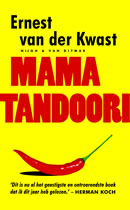Ernest van der Kwast
Mama Tandoori
Free is good
In the autobiographical novel Mama Tandoori, Ernest van der Kwast paints a hilarious but moving portrait of his Indian and Dutch family. The protagonist is his mother, Veena. An Indian nurse, she comes to the Netherlands and, after a thousand rejections, finally marries prospective doctor, Theo van der Kwast. Once married, she turns out to be an exuberant fury who keeps her family strictly under her thumb – with a rolling pin, if necessary. She is particularly characterised by her search for discounts, bargains and special offers. Always looking for the cheapest, she believes ‘free is good’, even when it’s useless junk. ‘Never marry an Indian,’ is therefore Theo’s motto. Although a doctor and a researcher, his wife claims he earns no more than ‘a rickshaw puller in Bangalore,’ prompting him to mumble, ‘If only I were a rat in Delhi.’
But Van der Kwast has done more than create a funny portrait of a woman who buys cat food because it’s on offer, despite the fact that they don’t have a cat and their guinea pig refuses to eat it. He also has a keen eye for the tragedies that befall his mother and the family. Veena has pinned all her hope on her eldest son, who is mentally handicapped. Although he will never be able to jump five classes to become a lawyer, a doctor or an accountant, she never gives up hope, sending him to faith healers, Lourdes and various other places of pilgrimage. And, all the while her other two sons, who do get university degrees, never have her approval. Middle son, Johan, comes home with a Muslim – which, to his mother, a Hindu who fled Pakistan, is the worst he could do to her. He ends up with big bruises from the rolling pin. The narrator, too, is hit with it when he announces he wants to become a writer instead of an economist. Still, he creates a predominantly affectionate portrait. And that is equally true of the depictions of the troubled characters on father’s side of the family, like Uncle Herbert who, after trial and error, fails in Canada.
Mama Tandoori could be considered a political statement in the current heated Dutch integration debate, a plea for a multicultural society. But it isn’t. Van der Kwast writes about it with a casualness that side-steps this entire discussion. Mama Tandoori is a lucidly told, extremely infectious story – except perhaps to Veena, who calls the novel a friction.
Publisher
Nijgh & Van Ditmar
Singel 262
NL - 1016 AC Amsterdam
TEL. +31 20 551 12 62
FAX +31 20 627 36 26
E-mail: [email protected]
Website: www.uitgeverijnijghenvanditmar.nl
Publishing details
Mama Tandoori (2010, 214 pp)

Biography
The first book by Ernest van der Kwast (b. Bombay, 1981), a collection of short stories entitled Man zoekt vrouw om hem gelukkig te maken (Man Seeks Woman to Make Him Happy, 2003) was co-written with five other authors and published under the pen name Yusef el Halal. In 2007, Van der Kwast wrote Stand in, a novel published under the name of Sieger Sloot. Using his own name, he published Soms zijn de dingen mooier als er mensen klappen (Sometimes Things Are More Beautiful When People Clap, 2005) and the critically acclaimed Mama Tandoori (2010).
Website: www.ernestvanderkwast.nl
Quotes
Hilarious portrait of an Indian-Dutch family.
Elsevier
When it comes to style, timing and feeling for language, Van der Kwast is up there with the best.
Vrij Nederland
Heart-rendingly hilarious.
Wereldomroep
